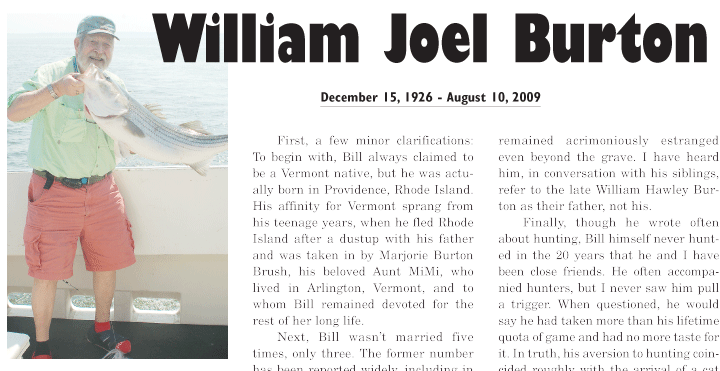
Volume XVII, Issue 33 # August 13 - August 19, 2009 |
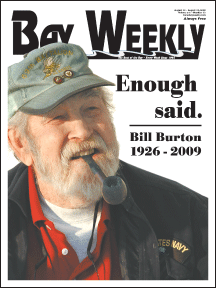 |
Bill Burton lived and loved in the extreme
by Alan Doelp
Regular visitors to this space already know a great deal about Bill Burton — about his Navy service, his many years in the newspaper business, his opinions on many topics, his enduring love of the Chesapeake and everything outdoors, and for the last eight years, his great love affair with a young lady named Grumpy, a.k.a. Mackenzie Noelle Boughey, his granddaughter.
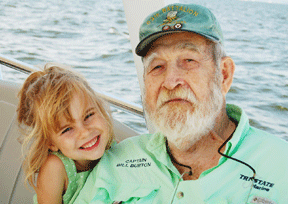 |
Regular readers already know a great deal about Bill Burton — about his great love affair with a young lady named Grumpy, a.k.a. Mackenzie Noelle Boughey, his granddaughter. |
![]() Most of what you have read in these columns is actually true, a credit to a man who for 62 years made a living telling stories about fishing and hunting. From time to time, though, he did leave a few things out, and today we undertake to fill in a few of those gaps — to round out the character without necessarily diminishing the legend.
Most of what you have read in these columns is actually true, a credit to a man who for 62 years made a living telling stories about fishing and hunting. From time to time, though, he did leave a few things out, and today we undertake to fill in a few of those gaps — to round out the character without necessarily diminishing the legend.
First, a few minor clarifications: To begin with, Bill always claimed to be a Vermont native, but he was actually born in Providence, Rhode Island. His affinity for Vermont sprang from his teenage years, when he fled Rhode Island after a dustup with his father and was taken in by Marjorie Burton Brush, his beloved Aunt MiMi, who lived in Arlington, Vermont, and to whom Bill remained devoted for the rest of her long life.
Next, Bill wasn’t married five times, only three. The former number has been reported widely, including in this publication, and the number could only have come from Bill, but it was an exaggeration — perhaps intended to annoy his father, from whom Bill remained acrimoniously estranged even beyond the grave. I have heard him, in conversation with his siblings, refer to the late William Hawley Burton as their father, not his.
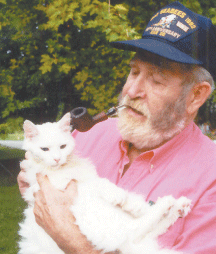 |
Bill’s aversion to hunting coincided with the arrival of a cat named Frieda Lawrence, who forever altered his relationship with the animal kingdom. |
![]() Finally, though he wrote often about hunting, Bill himself never hunted in the 20 years that he and I have been close friends. He often accompanied hunters, but I never saw him pull a trigger. When questioned, he would say he had taken more than his lifetime quota of game and had no more taste for it. In truth, his aversion to hunting coincided roughly with the arrival of a cat named Frieda Lawrence, who meowed and purred her way so deep into Bill’s heart that she forever altered his relationship with the animal kingdom.
Finally, though he wrote often about hunting, Bill himself never hunted in the 20 years that he and I have been close friends. He often accompanied hunters, but I never saw him pull a trigger. When questioned, he would say he had taken more than his lifetime quota of game and had no more taste for it. In truth, his aversion to hunting coincided roughly with the arrival of a cat named Frieda Lawrence, who meowed and purred her way so deep into Bill’s heart that she forever altered his relationship with the animal kingdom.
All of which reinforces the next point about Bill: He did not have time for half-hearted relationships. If he liked you, he was a devoted and constant friend. If he didn’t, you had faint hope of redemption. Happily, except for his father and a few editors over the years, there weren’t many people that Bill didn’t like.
Obsessive? Compulsive?
He had a work ethic that was the envy of the most energetic journalism school graduate; even in recent years, as old age and a trio of diseases took their toll, he struggled to crank out his twice-weekly outdoor column for The Capital, not to mention his Bay Weekly essays.
A good part of that energy sprang from a more than moderate dose of obsessive-compulsive disorder. It served him well in the deadline-obsessed newspaper business. But it caused strains in other parts of his life, when his reverence for deadlines sometimes got out of hand. On one notable occasion not too long ago, he drove several miles on a flat tire rather than be late for a doctor’s appointment.
The OCD played out in other ways. Bill notoriously wrote his name and phone number on everything he owned, from his favorite walking stick to his blaze-orange backpack. On especially valuable items, like his extra-large address book, he also would write his address, along with the word reward in large print. This may seem trivial if you don’t know how much stuff Bill owned. I’d be happy to have just what he spent on magic markers. He had a lot of stuff.
 |
Bill and his son, Joel, and daughters Kathy, Liz, Heather, Turee and Ellen. |
![]() Shopping with Bill was an experience to be avoided, especially if you had to be somewhere later in the day. Bill was capable of spending hours examining every item on every clothing rack in an entire store, and he would no more go shopping without buying something than he would step off a boat without a fish. I once counted the shirts hanging in the basement of his house; there were 146 of them. I asked him why he had 146 shirts hanging in his basement and he replied cheerfully, “because there’s no room for them in the closet.”
Shopping with Bill was an experience to be avoided, especially if you had to be somewhere later in the day. Bill was capable of spending hours examining every item on every clothing rack in an entire store, and he would no more go shopping without buying something than he would step off a boat without a fish. I once counted the shirts hanging in the basement of his house; there were 146 of them. I asked him why he had 146 shirts hanging in his basement and he replied cheerfully, “because there’s no room for them in the closet.”
Couple a Depression-era childhood with OCD, and you get a packrat of such enormous appetite that it may be years before Bill’s stash of junk is completely reduced. He had more than 40 rolls of duct tape. “It was on sale,” he explained. He had more than 60 screwdrivers, hundreds of pens, a dozen electric drills, scores of baseball caps. He had jackets he’d never worn, pipes he’d never smoked, computer equipment that had never been hooked up. He also had telephones that were broken, pens that didn’t write, batteries so old they had mold on them and spare parts for appliances long gone.
The basement resembles a Salvation Army warehouse; the piles are shoulder-high. There are narrow pathways winding among the mountains of boxes containing most of the articles Bill ever wrote, and most of the photos he ever took. The volume is staggering. Bill wrote three or more columns a week for about 55 years — call it 9,000 columns in round figures. He saved them all. He even claimed to know where they were. It’s a big basement. And it’s full.
Bill’s Big Bites
When Bill left the Sunpapers, he set up an office in one room of his basement and used it until the clutter became unmanageable, whereupon he moved his office to another room. I can find at least two basement offices (there may be more) that he abandoned because they were full. Newspapermen are untidy creatures by nature; Bill elevated clutter to heights unthinkable.
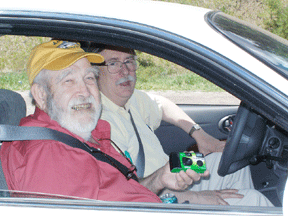 |
Riding in Bill’s car was more exciting than any carnival ride and more dangerous. I never believed in guardian angels until I rode with Bill. Angels or no, I did the driving from then on. |
![]() Bill took most things to extremes. His approach to life was always the full frontal assault, no quarter given, none asked. If something could be done to excess, Bill did it. He ate hugely and frequently. In between marriages, his drinking and carousing escapades were the stuff of legend around the Evening Sun newsroom, as was his reporting.
Bill took most things to extremes. His approach to life was always the full frontal assault, no quarter given, none asked. If something could be done to excess, Bill did it. He ate hugely and frequently. In between marriages, his drinking and carousing escapades were the stuff of legend around the Evening Sun newsroom, as was his reporting.
He was the only reporter allowed by the union to take his own photographs, after the staff photographers, to a man, refused to accompany him on fishing trips in six-foot seas, or backpacking trips in Vermont winters, or camping trips in mosquito-infested Assateague. The more extreme the activity or the environment, the more Bill loved it.
His penchant for the extreme ran through every facet of his life including relationships. He was never just a friend; if he was your friend, he was your devoted and loyal and faithful friend, a friend who would loan you money, cover your back in a fight or give you his shirt if that’s what the situation called for. With family (excepting William Hawley Burton, of course) he was equally fierce in his devotion, whether the family members were blood relatives or extended family — and there are many of us in one or the other of those categories. There’s an old saying that to enjoy the flavor of life, you must take big bites. Bill always took big bites.
By His Own Rules
Dr. Larry Stafford, Bill’s cardiologist and fishing buddy, will be much displeased to discover that even after Bill had three heart attacks, a double angioplasty and a pacemaker/defibrillator implant, he cheerfully ignored Dr. Stafford’s orders to stop smoking. To Bill’s credit he did try for a couple weeks, but then he went back to his pipe. He said he could no more write without his pipe than Samson could lift weights without his hair.
He was equally cavalier about his diabetes, which he developed 30 years ago, and which, despite his haphazard management, claimed only three of his toes. As with his pipe, Bill reveled in the knowledge that all the forbidden ice cream sundaes, milkshakes, candy bars, brownies and Boston cream pies had, in the end, not mattered nearly as much as all the doctors, friends and family had predicted. Bill was never shy about claiming victory in any argument.
Though not shy about anything, Bill always downplayed his celebrity status, which after 55 years was considerable. I never appreciated it until the day I saw Brooks Robinson ask Bill for his autograph. Bill was always gracious with his admirers but never much impressed with his fame. He did admit that it came in handy a couple times when he was stopped for speeding by cops who were, as it happened, fishermen and devoted readers.
The absence of a bad driving record should not, however, be taken as evidence that Bill was a good driver. Riding in Bill’s car (license plate: luv bass) was more exciting than any carnival ride and a good deal more dangerous. I never believed in guardian angels until I rode with Bill. He must have had a whole platoon of angels protecting him, and he drove like he knew it. Angels or no, I did the driving from then on.
A Man of the Road — and World
Bill and I took many road trips over the years — to Western Maryland for deer season, to Rhode Island for family reunions, to Vermont to visit Aunt MiMi, everywhere for fishing. Without exception they were chaotic excursions full of wrong turns, detours and highly profane arguments over who was to blame. Leaving Rhode Island last year, Bill repeatedly ignored my pleas to go early and avoid the traffic. When, hours later, we were inching along Interstate 95 somewhere in New York, Bill casually remarked, “You know, if we’d have left early, we’d have missed all of this.”
Being from a family top-heavy with eccentric geniuses, Bill came by his curmudgeonly ways naturally and with gusto. Some time ago I hosted a dinner for Bill and all four of his siblings. It was a wondrous evening. The five Burton kids flung barbs — mostly good-natured — throughout the entire meal and well into the evening. Clearly Bill’s talent for cheerful invective began at home.
Despite his curmudgeonly demeanor, Bill was a gentleman, truly old school. For all the locker-room talk, he never swore in front of ladies, and when the occasion required it, he could display dancing-school good manners, while never quite giving up the rough-hewn, outdoorsy image that he cultivated so carefully.
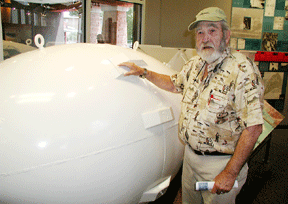 |
“I don’t care what people say. This is what saved my life,” Bill said when at the museum at Los Alamos, where the spare casings of Fat Man and Little Boy are on display. |
![]() Nor was he limited intellectually by his love of the outdoors. He was perhaps the only hunter who ever carried a book of Robert Frost’s poems into a goose blind. He not only read poetry, he wrote it, and I have hopes that in the mountain of papers he left behind, some of it will come to light. His own writing style had a poet’s cadence and rhythm about it — grammatically challenged sometimes, but always melodious, always easy to read.
Nor was he limited intellectually by his love of the outdoors. He was perhaps the only hunter who ever carried a book of Robert Frost’s poems into a goose blind. He not only read poetry, he wrote it, and I have hopes that in the mountain of papers he left behind, some of it will come to light. His own writing style had a poet’s cadence and rhythm about it — grammatically challenged sometimes, but always melodious, always easy to read.
During Bill’s abbreviated high school career, the principal once called him in to scold him about missing class. “Burton, you’ll never amount to anything if you don’t study harder. All you want to do is hunt and fish. You can’t make a living hunting and fishing,” the man lectured Bill.
I only hope the principal lived long enough to see Bill become the first (and so far only) outdoor writer ever voted into the Sportswriter’s Hall of Fame. In April of this year he joined the Maryland-Delaware-D.C. Press Association’s Newspaper Hall of Fame as well.
Schooling may have held no allure for Bill, but he was perhaps the best-read outdoorsman of his time. He was a voracious reader of history and biography. He subscribed to The New Yorker and The Wall Street Journal, and actually read them. Every edition. He was an opera buff, an admirer of art and a fan of old movies, particularly war dramas and documentaries.
He was one of the most patriotic men I’ve ever known. He enlisted in the Navy late in World War II, served in the Marine Corps, became a Seabee and was in Hawaii training for the invasion of Japan when two atomic bombs ended the war. Nearly 60 years later, Bill and I visited the museum at Los Alamos, where the spare casings of Fat Man and Little Boy are on display, and the sight of them got him choked up. “I don’t care what people say,” he said. “This is what saved my life.”
Memorial Day was always a big holiday for Bill. He liked to attend the big parade in Gettysburg, one of the best anywhere. He would arrive early, flag in hand, and he never stopped waving his flag until the last costumed Minuteman had marched over the hill toward Chambersburg. Though not a violent man by nature, he once attacked a flag-burner in Washington and had to be restrained by police. Like his devotion to his family and friends, his love of country was deep, profound and unconditional.
Enough Said
By any standard, Bill packed more than 82 and a half years of living into the 82 and a half years of his existence. He acquired friends by the score, admirers by the thousands, readers by who knows what order of magnitude — tens, perhaps hundreds of thousands of lives touched. His presence was enormous; his loss equally large. He takes with him a knowledge and love of Maryland’s outdoors and outdoorsmen that we cannot replace. Nor should we try.
Enough said.
